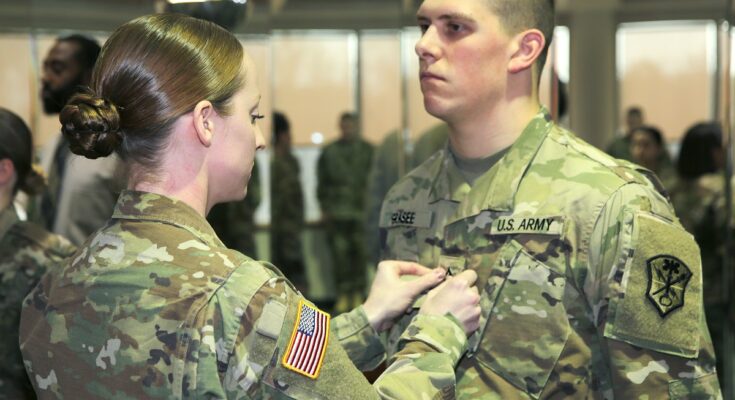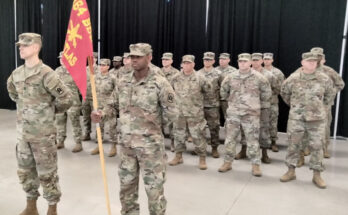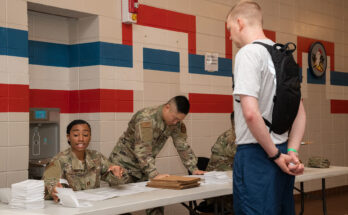The United States Army Special Forces, often known as the “Green Berets” due to their distinctive headwear, represent one of the most elite and versatile units in the U.S. military. Founded in the early 1950s, they’ve played pivotal roles in various operations, from unconventional warfare and counter-insurgency to peacekeeping and rescue missions.
Their importance in national defense is profound. Special Forces aren’t just soldiers; they’re experts in multiple disciplines, from languages to diplomacy, and are often deployed in sensitive and critical situations where precision, discretion, and adaptability are paramount.
Their unique training and expertise make them an indispensable asset in safeguarding the nation against both conventional and unconventional threats. In an ever-evolving global landscape, the role of the U.S. Army Special Forces has never been more crucial.
Requirements for Joining the United States Army Special Forces
Joining the United States Army Special Forces is a prestigious honor, but it demands unwavering commitment, exceptional physical fitness, and a strong mental constitution. If you’re considering this path, understanding the basic requirements is crucial. Here’s a succinct overview of the key prerequisites:
1. Basic Eligibility Criteria:
- Citizenship: You must be a U.S. citizen.
- Age: Typically, candidates need to be between the ages of 20 and 30. However, age waivers are sometimes available.
- Educational Qualifications: A high school diploma or its equivalent (GED) is required. Some positions may have additional education prerequisites.
- Security Clearance: A favorable background check leading to the ability to obtain a security clearance is mandatory.
- Service Status: Current active duty soldiers or those willing to enlist in the U.S. Army can apply.
2. Physical Fitness Standards:
- Basic Physical Fitness Test (PFT): Candidates must pass the Army’s PFT, which includes push-ups, sit-ups, and a 2-mile run.
- Special Forces Assessment and Selection (SFAS) Physical Fitness: This is a more rigorous test that includes a multitude of challenges tailored to mimic the demands of Special Forces operations. These can include long-distance ruck marches, swimming tests, and more.
- Medical Standards: Candidates must meet the Army’s medical fitness standards, which includes vision, hearing, and overall health assessments.
3. Mental and Psychological Assessments:
- Cognitive Testing: Measures your ability to process information, problem-solve, and think critically.
- Psychological Evaluation: A series of assessments to ensure candidates have the mental resilience, emotional stability, and psychological fortitude required for Special Forces operations.
- Interviews: Personal interviews can also be part of the selection process, gauging a candidate’s motivation, commitment, and suitability for the demanding role.
However, joining the U.S. Army Special Forces requires more than just a desire; it mandates a combination of physical prowess, mental strength, and meeting specific eligibility standards. Those who meet these rigorous demands are among the elite, serving their nation in one of the most challenging and rewarding capacities.
Remember, while these are general guidelines, the exact requirements can change, and it’s always a good idea to consult the official U.S. Army recruitment websites or local recruiters for the most up-to-date information.
United States Army Special Forces Recruitment Programs:
Direct Entry Program:
The Direct Entry Program provides a straightforward pathway for individuals keen on joining the Army Special Forces. Unlike other recruitment methods which might require prior military experience or a longer path to Special Forces selection, the Direct Entry Program is designed for both those new to the military and those with prior service. It offers a direct route to Special Forces Assessment and Selection (SFAS) and subsequently, the Special Forces Qualification Course.
Steps and stages in the process:
- Initial application and eligibility checks.
- Attending the Special Forces Assessment and Selection (SFAS).
- On successful completion of SFAS, candidates proceed to the Special Forces Qualification Course (SFQC).
- Graduates from SFQC are awarded the Green Beret and assigned to a Special Forces Group.
Rep 63 Program:
The Rep 63 Program is specifically designed for National Guard candidates aspiring to become Special Forces Soldiers. Its primary goal is to identify, recruit, and train National Guard personnel for the Special Forces, ensuring they meet the same rigorous standards as their active-duty counterparts.
How to apply and the training involved:
- Candidates must first enlist into the National Guard and secure a Rep 63 contract.
- Attend Basic Combat Training (BCT) followed by Advanced Individual Training (AIT).
- Proceed to the Special Forces Assessment and Selection (SFAS).
- Successful candidates will then advance to the Special Forces Qualification Course (SFQC).
18X Special Forces Enlistment Option:
The 18X enlistment option, commonly referred to as the “X-Ray” program, is a pathway for those without prior military service to directly pursue a career in Special Forces. It not only provides a direct route into the Special Forces community but also guarantees a slot at the Special Forces Assessment and Selection (SFAS) after completing initial training. This is an enticing option for those who have their sights set on becoming a Green Beret from the outset.
Training pipeline and what to expect:
- Attend Basic Combat Training (BCT) to learn basic soldiering skills.
- Progress to Advanced Individual Training (AIT) for infantry tactics.
- Attend the Airborne School for paratrooper training.
- Secure a slot and attend the Special Forces Assessment and Selection (SFAS).
- Successful candidates proceed to the Special Forces Qualification Course (SFQC), where they undergo intense training in various Special Forces disciplines.
However, each recruitment program offers its unique path and opportunities. Regardless of the route chosen, dedication, resilience, and commitment are essential traits for success in the rigorous world of Army Special Forces.
Training and Preparation of United States Army Special Forces Recruitment
When it comes to the elite forces of the United States Army, the Special Forces stand out prominently. The journey to become a Green Beret, as members are often referred to, is demanding both physically and mentally. Here’s a brief overview of the pivotal training phases that candidates undergo:
Basic Combat Training (BCT) and Advanced Individual Training (AIT):
- Purpose: This is where the transformation begins. BCT introduces recruits to the foundational skills required in the military – from physical fitness, weapons training, to teamwork. It establishes the groundwork for discipline and tactical prowess. Once completed, recruits move to AIT, where they get specialized training in their chosen Military Occupational Specialty (MOS). This ensures that they have the technical know-how to serve their specific roles within the army.
- Key Benefit: These initial trainings ensure that all soldiers, irrespective of their future assignments, possess a baseline of combat and technical skills.
Special Forces Assessment and Selection (SFAS):
- Purpose: This rigorous phase acts as a filter. Not everyone is cut out to be a part of the Special Forces, and this phase assesses a recruit’s physical fitness, mental fortitude, and teamwork skills. Over a period of 24 days, candidates are pushed to their limits through a series of intense drills, challenges, and evaluations.
- Key Benefit: SFAS identifies individuals with the raw potential and resilience required for advanced Special Forces training. Only those who showcase extraordinary abilities proceed to the next phase.
Special Forces Qualification Course (SFQC):
- Purpose: Often termed as the “finishing school,” SFQC is where candidates are moulded into fully-fledged Special Forces soldiers. Spanning across several months, this course dives deep into unconventional warfare tactics, language training, and other mission-specific skills. By its end, candidates are ready for deployment and real-world missions.
- Key Benefit: SFQC ensures that each Special Forces soldier is equipped with the specialized skills needed to undertake covert operations, foreign internal defense, and other high-stakes missions on a global scale.
However, the journey to becoming a member of the United States Army Special Forces is no easy feat. From the foundational skills acquired in BCT and AIT, to the intense selection process of SFAS and the intricate training in SFQC, only the best emerge ready to serve with distinction and honor.
Roles within the United States Army Special Forces:
The United States Army Special Forces, often referred to as the Green Berets, play a critical role in defense and special operations. They comprise elite professionals with specialized skills, ensuring that they can operate in diverse environments. Here’s a closer look at some of the key roles within this esteemed group:
1. Weapons Sergeant: This is the go-to expert for weapons utilization and tactics. They are responsible for knowing the ins and outs of numerous weapons systems, both domestic and foreign. A Weapons Sergeant will train fellow team members on effective weapon use and can quickly adapt to various battlefield scenarios.
2. Medical Sergeant: Health and emergency care in the field are under the purview of the Medical Sergeant. They are trained to provide top-notch medical care in austere environments, treating anything from common illnesses to combat-related injuries. Their ability to offer critical care in challenging situations is unparalleled.
3. Communications Sergeant: Effective communication is vital in special operations. The Communications Sergeant ensures that teams can maintain reliable communication lines, even in the most challenging environments. They handle a plethora of devices and are proficient in encryption, satellite communications, and other advanced techniques.
4. Engineer Sergeant: Infrastructure, fortifications, and demining operations are the Engineer Sergeant’s domain. Whether it’s constructing a shelter in a remote area or detecting and disposing of explosives, their technical know-how ensures that the team can navigate and operate in varied terrains safely.
5. Intelligence Sergeant: Information drives operations. The Intelligence Sergeant gathers, analyzes, and disseminates vital data. Their insights aid in mission planning, threat assessment, and strategic decision-making. They possess an acute ability to understand and predict adversary actions.
In essence, each role within the United States Army Special Forces is pivotal, ensuring the team’s collective success. Their specialized training and unwavering commitment make the Green Berets one of the most formidable forces in the military landscape.
Benefits of Joining the United States Army Special Forces
When considering a career in the military, joining the United States Army Special Forces presents a unique and rewarding opportunity. Here’s a look at some of the top advantages:
Competitive Pay and Allowances: The U.S. Army Special Forces offers a compensation package that stands out. Not only will you receive a competitive salary, but you’ll also benefit from various allowances. This can make a significant difference in your overall earnings, especially when compared to many civilian professions.
Opportunities for Advanced Training and Education: As a member of the Special Forces, you’ll have access to world-class training programs that aren’t available anywhere else. This advanced training will not only prepare you for the challenging missions you’ll face but also pave the way for your professional growth. Furthermore, the Army provides educational benefits that can support your pursuits of higher education, both during and after your service.
Serving the Nation in Unique and Critical Missions: Perhaps the most compelling benefit is the chance to serve your country in ways few can imagine. Special Forces operations often involve critical tasks that have a direct impact on national security. You’ll be at the forefront of these missions, using your skills and training to make a real difference.
However, joining the U.S. Army Special Forces not only offers personal and financial rewards but also the deep satisfaction of serving the nation in a distinctive and impactful way. If you’re looking for a career that challenges and rewards you at every turn, this might be the path for you.
United States Army Special Forces Recruitment Application Process and Timeline
1. How and Where to Apply
- Begin by visiting the official U.S. Army recruiting website.
- Locate the section dedicated to the Special Forces (often referred to as the “Green Berets”).
- Fill out the preliminary application form with all relevant details.
- You might also visit your local Army recruiting station for personalized guidance. An experienced recruiter can provide insights specific to Special Forces recruitment.
2. Anticipated Wait Times and Stages of Selection
- Preliminary Review: Once your application is submitted, expect a wait time of 2-4 weeks for initial review.
- Physical and Medical Screening: If you pass the preliminary review, you’ll be invited for a physical and medical examination. This can take another 2-3 weeks.
- Assessment and Selection (A&S) Phase: Successful candidates will proceed to the A&S phase, a rigorous test of physical fitness, mental endurance, and adaptability. This phase lasts about 3 weeks.
- Special Forces Qualification Course (SFQC): Candidates who excel in the A&S phase move onto the SFQC. The duration and timeline for this phase can vary based on the specific training involved but expect it to last several months.
- Final Review and Assignment: After successful completion of all stages, candidates undergo a final review which might take another 2-3 weeks, followed by their assignment to a Special Forces Group.
3. Tips for a Successful Application
- Stay Physically Fit: The Special Forces places a high emphasis on physical fitness. Regularly engage in endurance, strength, and flexibility training.
- Enhance Mental Toughness: Build resilience and adaptability. Read about the experiences of past Special Forces members or undertake challenging experiences to strengthen your mental endurance.
- Be Honest: Fill out your application truthfully. Any inconsistencies can lead to disqualification.
- Seek Mentorship: Connect with current or former Special Forces members. Their guidance can be invaluable throughout the application process.
- Stay Updated: Ensure that all documents and references are up-to-date. Regularly check the official Army website or communicate with your recruiter for any changes in the application process.
Remember, joining the Special Forces is a commitment that requires dedication, resilience, and adaptability. Prepare thoroughly, and you’ll be well on your way to embarking on one of the most challenging and rewarding careers in the U.S. Army.
Conclusion:
In the annals of military history, few stand as prominently as the United States Army Special Forces. With unparalleled prestige and honor attached to its name, serving in this elite division is more than just a career – it’s a testament to one’s dedication, valor, and relentless pursuit of excellence.
To those considering this path, remember that the journey might be arduous, but the rewards are unmatched. You won’t just be wearing a badge; you’ll be carrying forward a legacy. Embrace the challenge, be the difference, and earn your place amongst the best of the best. The opportunity awaits for you to be a part of this elite group. Take the leap, and etch your name in history.



